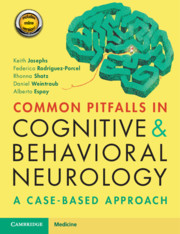Book contents
- Common Pitfalls in Cognitive and Behavioral Neurology
- Common Pitfalls in Cognitive and Behavioral Neurology
- Copyright page
- Dedication
- Contents
- Diseases Discussed in the Book
- Preface
- Acknowledgements
- Abbreviations
- Part 1 Missing the Diagnosis Altogether
- Part 2 Misidentifying the Impaired Cognitive Domain
- Part 3 Missing Important Clues in the History
- Part 4 Failure of Pattern Recognition
- Part 5 Difficult-to-Characterize Cognitive/Behavioral Disorders
- Part 6 Clinical Findings That Are Subtle
- Part 7 Misinterpreting Test Results
- Part 8 Attributing Findings to a Known or Suspected Disorder
- Part 9 Missing Radiographic Clues
- Part 10 Management Misadventures
- Case 46 I Don’t Know When to Stop
- Case 47 Is It Still Helping?
- Case 48 Caring for the Caregiver
- Case 49 Better Safe than Sorry?
- Case 50 Great Expectations
- Case 51 Nothing Can Be Done
- Index
- Plate Section (PDF Only)
- References
Case 49 - Better Safe than Sorry?
from Part 10 - Management Misadventures
Published online by Cambridge University Press: 03 November 2020
- Common Pitfalls in Cognitive and Behavioral Neurology
- Common Pitfalls in Cognitive and Behavioral Neurology
- Copyright page
- Dedication
- Contents
- Diseases Discussed in the Book
- Preface
- Acknowledgements
- Abbreviations
- Part 1 Missing the Diagnosis Altogether
- Part 2 Misidentifying the Impaired Cognitive Domain
- Part 3 Missing Important Clues in the History
- Part 4 Failure of Pattern Recognition
- Part 5 Difficult-to-Characterize Cognitive/Behavioral Disorders
- Part 6 Clinical Findings That Are Subtle
- Part 7 Misinterpreting Test Results
- Part 8 Attributing Findings to a Known or Suspected Disorder
- Part 9 Missing Radiographic Clues
- Part 10 Management Misadventures
- Case 46 I Don’t Know When to Stop
- Case 47 Is It Still Helping?
- Case 48 Caring for the Caregiver
- Case 49 Better Safe than Sorry?
- Case 50 Great Expectations
- Case 51 Nothing Can Be Done
- Index
- Plate Section (PDF Only)
- References
Summary
This 67-year-old right-handed man presented with a 2-year history of progressive memory decline. He first noticed that he required an increasing number of written reminders at work. However, his performance as an accountant was not affected. At home, his wife started writing grocery lists for him, which she had never done before. He reported difficulty coming up with words and recalling names, particularly if he had recently met the person. He was able to perform all his activities of daily living independently, except for his finances, which his children were now supervising. Under the counsel of his children, he was now considering retirement. His motor examination was unremarkable.
- Type
- Chapter
- Information
- Common Pitfalls in Cognitive and Behavioral NeurologyA Case-Based Approach, pp. 158 - 160Publisher: Cambridge University PressPrint publication year: 2020



